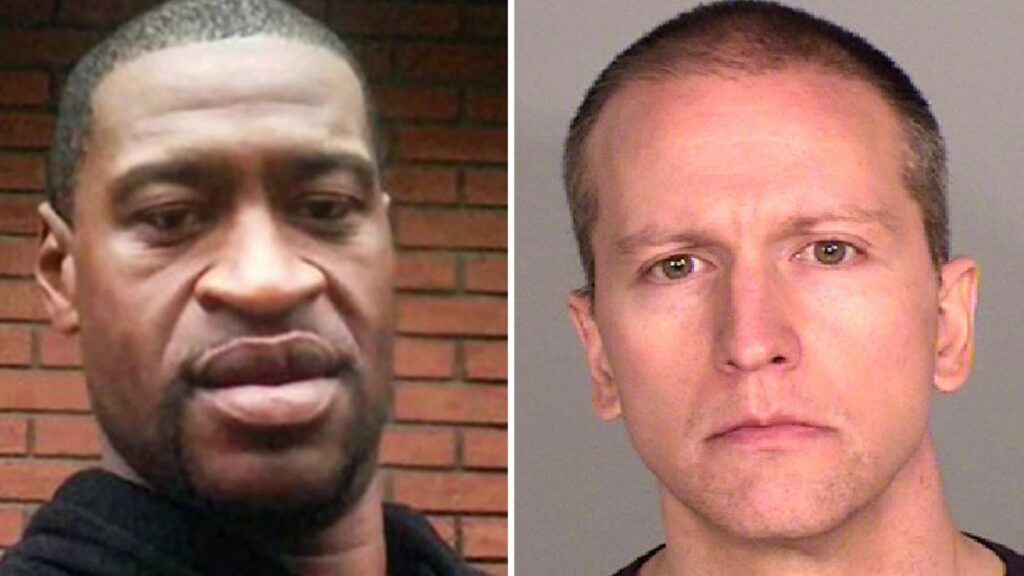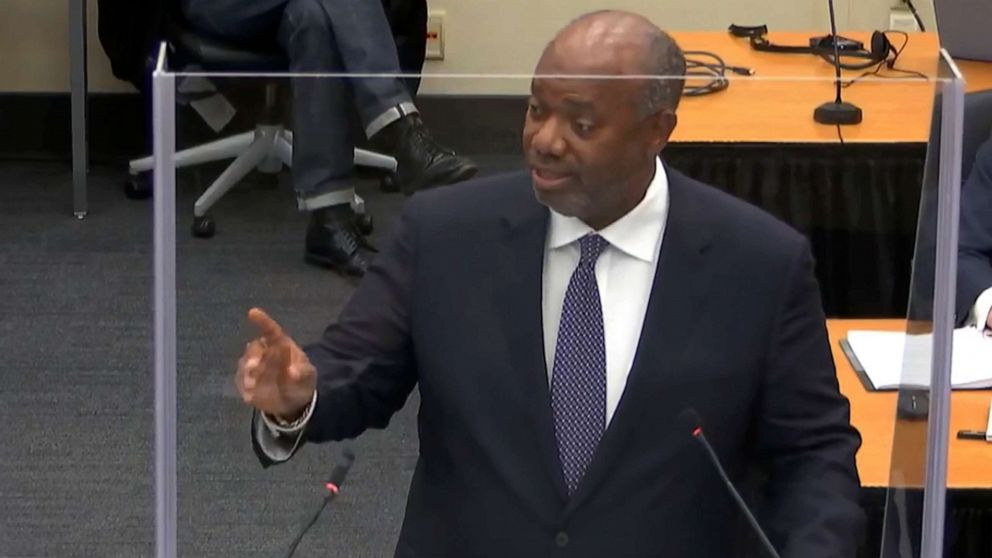
Chauvin is facing second and third-degree murder in the death of George Floyd.
The prosecution and defense in the murder trial of former Minneapolis police officer Derek Chauvin for the death of George Floyd are set to take their final cracks on Monday at swaying jurors after calling more than 40 witnesses and presenting numerous videos of the 46-year-old Black man’s fatal 2020 arrest.
Latest headlines:
- Jury heads into deliberation
- Defense concludes closing argument
- Prosecutors want jury to ignore Floyd’s significant medical issues, defense says
- Defense attacks doctors who testified as witnesses for state
- State has a large burden of proof, defense says
- Defense urges jury to decide whether Chauvin intentionally applied unlawful force
Roseville students protest outside police department as deliberations continue
Hundreds of high school students in Roseville, Minnesota joined a student walkout as deliberations continue in the Chauvin trial.
The Roseville Area High School students gathered outside the school just before 1 p.m. local time and marched to the Roseville Police Department, about a mile away. They wore black in solidarity for Floyd and the Black community.
Judge says trial could be appealed over Rep. Maxine Waters’ remarks
Defense attorney Eric Nelson argued for a mistrial over comments Rep. Maxine Waters made regarding the trial over the weekend.

“We’ve got to stay on the street, and we’ve got to get more active, we’ve got to get more confrontational,” Waters said at a demonstration in Brooklyn Center, Minnesota, on Saturday night when asked what protesters should do if Derek Chauvin is found not guilty.
Nelson brought up the comments after the jury was sent to deliberations Monday, saying he interpreted them “to be threats against the sanctity of the jury process” by “demanding that if there’s not a guilty verdict that there would be further problems.”
Judge Cahill denied the motion for a mistrial, saying jurors had been instructed not to watch the news and therefore couldn’t be prejudiced by the comments, but noted that “Congresswoman Waters may have given you something on appeal that may result in this whole trial being overturned.”
“I wish elected officials would stop talking about this case, especially in a manner that is disrespectful to the rule of law, or to the judicial branch in our function,” he later added. “I think if they want to give their opinions, they should do so in a respectful, and in a manner that is consistent with their oath to the Constitution.”
Jury heads into deliberation
After closing arguments from the prosecution and the defense, jurors were sent to deliberate the case against Derek Chauvin.
“The state of Minnesota and the Defendant have a right to demand, and they do demand, that you will consider and weigh the evidence, apply the law, and reach a just verdict regardless of what the consequence might be,” Judge Cahill instructed the jury. “You must be absolutely fair. Remember that it is fair to find the Defendant guilty if the evidence and the law require it. On the other hand, it is fair to find the Defendant not guilty if you are not convinced of his guilt beyond a reasonable doubt.”
“Now, members of the jury, the case is in your hands as judges of the fact,” he said. “I’m certain that you realize this case is important, serious, and, therefore, deserves your careful consideration.”
The jury will be sequestered until jurors reach a verdict.
Closing arguments have wrapped. Judge Cahill is now handing the case over to the jury.
Last witness is ‘common sense,’ state says in rebuttal argument

In the prosecution’s rebuttal, Minnesota Assistant Attorney General Jerry Blackwell brought “common sense” as the 46th witness in the case, stating that even a 9-year-old girl who witnessed Floyd’s death told Chauvin to get off of him.
“Why is it necessary to continue applying deadly restraint to a man who is defenseless, who is handcuffed, who is not resisting, who is not breathing, who doesn’t have a pulse, and to go on and do that for another 3-plus minutes before the ambulance shows up, and then to continue doing it?” Blackwell asked. “How is that a reasonable exercise in the use of force?”
Blackwell also disputed Nelson’s portrayal of Chauvin as a reasonable police officer, saying the defense did not give the jury “the whole truth.”
“Notice how when you had the discussion about reasonable officer Mr. Chauvin, the whole narrative cut off before we get to the point that Mr. Floyd was not moving, that he was not conscious, that he didn’t have a pulse, and Mr. Chauvin was still on top of him when the EMTs showed up, and he did not get off of him,” Blackwell said. “How is that what a reasonable officer does?”
Defense concludes closing argument
Nelson wrapped up his closing statement by stating that prosecutors failed to prove its case beyond a reasonable doubt and that Chauvin should be found not guilty on all counts.
“Human beings make decisions, in highly stressful, situations that they believe to be right in the very moment it is occurring. There’s lots of what-if’s that could have happened. What could have happened, what should have happened — lots of them in lots of regards,” Nelson said. “But we have to analyze this case from the perspective of a reasonable police officer at the precise moment, with the totality of the circumstances when it comes to the use of force.”
Cahill then sent the jury out for a five-minute lawyer conference.
Prosecutors want jury to ignore Floyd’s significant medical issues, defense says
When court resumed after a 30-minute break, Nelson continued his closing arguments, stating that Floyd’s death was actually a “multi-factorial” process and claiming that prosecutors want to ignore his significant medical issues.
Nelson said that, according to the state, Floyd’s coronary heart disease, hypertensive disease, use of drugs that acted further to constrict Floyd’s already diseased heart and adrenaline coursing through his body during the police confrontation were “not relevant.”
“They just want you to ignore significant medical issues that presented to Mr. Floyd,” Nelson said. “And the failure of the state’s experts to acknowledge any possibility, any possibility at all that any of these other factors in any way contributed to Mr. Floyd’s death defies medical science and it defies common sense and reason.”
Defense has resumed its closing arguments after the judge called for a lunch recess.
Defense attacks doctors who testified as witnesses for state
Nelson took down several of the doctors the prosecution brought on as witnesses, stating that they were incorrect in their testimonies.
Nelson criticized cardiologist Dr. Jonathan Rich, who concluded that Floyd had a strong heart despite a 90% narrowing of the right coronary artery, a 75% narrowing in the left anterior descending artery, enlarged heart and history of hypertension.
The testimonies of Rich and an additional four doctors fly “in the absolute face of reason and common sense,” especially in the testimony that none of Floyd’s preexisting conditions contributed to his death, Nelson said.
“It’s astounding,” he said.
State has a large burden of proof, defense says
Prosecutors have a laundry list of items to prove in order for Chauvin to be convicted, Nelson said.
The state’s burden of proof includes proving that Floyd’s heart disease, history of hypertension and toxicology levels played no role in his death, Nelson said.
The state must also convince the jury beyond a reasonable doubt that Floyd was not experiencing excited delirium that contributed to his death and that the adrenaline produced as a result Floyd’s physical resistance played no role, Nelson said.
Defense urges jury to decide whether Chauvin intentionally applied unlawful force
Nelson argued that Chauvin had no intent to purposefully use unlawful force.
“Officer Chauvin made a decision not to use higher levels of force when he would have been authorized to do that, including punches, kicks, elbows,” Nelson said.
“All of these tools were available to Officer Chauvin,” Nelson said, adding that officers called for EMS within one minute of putting Floyd on the ground.
Chauvin did not perform CPR because the environment was becoming hostile, defense says
Chauvin was occupied with a hostile crowd when Floyd took his last breath, making it difficult to perform CPR, Nelson said.
It is written in the Minneapolis Police Department to stop CPR when it is no longer safe to perform it, Nelson said, citing the testimony by Minneapolis Police Officer Nicole Mackenzie, the department’s medical support officer, who discussed the difficulty of performing CPR in hostile environments.
“She described how it’s incredibly difficult to perform EMS efforts in a loud crowd, difficult to focus when you don’t feel safe, makes it more difficult to assess a patient and makes it more likely you can miss signs that a patient is experiencing something,” Nelson said. “So the distraction, she said, can actually do harm to a patient.”
Crowds can change rapidly, defense says
Chauvin would have been paying attention to the behavior of the crowd surrounding him and the other officers while restraining Floyd, Nelson said.
Minnesota Police Department training includes tactics on how to deal with a crowd, especially to “never underestimate a crowd.”
“Crowds are very dynamic creatures and can change rapidly,” Nelson said.
The bystanders on the scene of the Cup Foods began to raise their voices and call Chauvin names as the incident went on, Nelson said.
How Chauvin interacted with a crowd is in line with how a reasonable police officer would act, Nelson said.
The cellphone video is not the ‘proper analysis,’ defense says
The 9-minute and 29-second cellphone video of Chauvin kneeling on Floyd “completely disregards” what happened leading up to the restraint, Nelson said.
While the prosecution has been focusing on the length of the cellphone video, “a reasonable police officer would have taken into consideration the previous 16 minutes and 59 seconds,” which included Floyd’s resistance, Nelson said.
“Human behavior is unpredictable, and nobody knows it better than a police officer,” Nelson said. “Someone can be compliant one second and fighting the next. Someone can be fighting and then compliant.”
Government buildings in downtown Minneapolis are being fortified in the event of unrest following a verdict in the Chauvin trial.
Defense plays police body camera footage of Floyd being put into the squad car
Floyd was engaging in active resistance when Chauvin arrived on the scene of the Cup Foods, Nelson said.
Nelson played the video from Nelson’s body camera that showed two other officers struggling to put Floyd into the squad car as evidence of Floyd’s resistance.
Nelson explained that a reasonable officer at that point would determine that the amount of force being used by the officers trying to put Floyd into the car was not enough to overpower Floyd’s resistance.



More Stories
Today’s News: March 26, 2024
The Greatest Purveyor of Violence In The World
Video: Fred Dashevsky – The CPI Fallacy